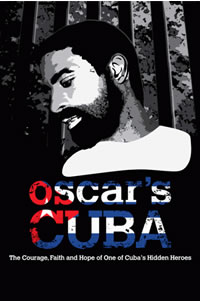 My previous post was about last year's release of Cuban political prisoners and the possibility that they were coerced into leaving Cuba as a condition for their release. That was back in July and much has happened since. Currently, 41 of 52 Cuban "Prisoners of Conscience" (listed by Amnesty International) arrested in the Black Spring of 2003 have been released. Forty of them now reside outside of Cuba. Only one was released inside Cuba. Eleven remain jailed.
My previous post was about last year's release of Cuban political prisoners and the possibility that they were coerced into leaving Cuba as a condition for their release. That was back in July and much has happened since. Currently, 41 of 52 Cuban "Prisoners of Conscience" (listed by Amnesty International) arrested in the Black Spring of 2003 have been released. Forty of them now reside outside of Cuba. Only one was released inside Cuba. Eleven remain jailed.I had argued that it was likely that the 52 political prisoners were coerced into leaving Cuba based on their public statements once arriving in Spain and a BBC Mundo report from inside the island. More recently, one of the released prisoners in Spain (Omar Rodríguez Saludes) recounted how he was approached to negotiate his release, only to further support the fact that prisoners were indeed coerced.
Now, some might say that this issue is almost irrelevant given that the released prisoners are now living alongside their families (over 130 family members were allowed to leave Cuba to join the released political prisoners) and in far better conditions than a rat and roach infested Cuban jail. But, this is about principle and respect for human rights.
According to Saludes, he was contacted in jail by Monsignor Jaime Ortega Alamino, archbishop of Havana, on July 8th, 2010 and told that Saludes was on a list of prisoners that would "shortly travel to Spain with their family members." All Saludes had to do was accept or refuse. In my opinion this is scandalous because Saludes was never given another reasonable option, only self-imposed exile. Furthermore, the possibility of being release inside Cuba by November was never suggested, nor taken seriously after all once the deadline passed.
Being subject to exile is a violation of Article 9 of the Universal Declaration of Human Rights. And, people incarcerated should never be forced to make such a decision, no matter how terrible their conditions. In the case of political prisoners, it only adds to their tragedy.
As for the 11 remaining political prisoners in Cuba that were supposed to be released last November, their families are hoping that the next few months will bring good news. In the meantime, the Cuban government is planning the release of other prisoners from jails (not on the list of "Prisoners of Conscience") perhaps hoping that some of the 11 will change their minds and choose self-imposed exile.
[Most recently released Cuban prisoner Egberto Ángel Escobedo Morales (not a "Prisoner of Conscience") celebrated his release by joining the Ladies in White this past Sunday. He is also a member of the dissident group Cuba Independent and Democratic (CID). Last June, Egberto was reported to be in grave health conditions, the local media (Telemundo51) described him as "following the path of Orlando Zapata."]
[I want to also reiterate that self-imposed or coerced exile is not "forced exile." The latter commonly suggests the use of physical force, which was not the case here.]







